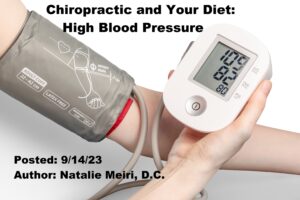
A Chiropractor in West Palm Beach can help you with many ailments by way of adjustments. However, the food you consume on a daily basis has a very large impact on your body and the thousands of underlying processes that go on inside it every day. Nutrition is certainly a significant factor in your health. So some of your lifestyle choices outside of the doctor’s office can influence the effectiveness of treatment. When you eat well, your immune system fights off illness better, you elevate your brain function, you lose weight and your energy soars. By incorporating certain foods into your diet, you can contribute to faster healing and continued wellness.
Meiri Chiropractic offers chiropractic care as well as tips for healthy living, including a diet plan. We can help you make good eating choices. In this blog post, we’ll take a closer look at how diet changes and chiropractic care can help improve your hypertension (high blood pressure).
What is Hypertension (high blood pressure)?
Hypertension is a systolic (pressure when your heart pushes blood out) blood pressure greater than 130 mmHg and/or a diastolic (pressure when your heart rests between beats) blood pressure greater than 80 mmHg. High blood pressure develops when blood flows through your arteries at higher-than-normal pressures. According to the Centers of Disease Control, nearly half of adults have hypertension (48.1%, 119.9 million). Unfortunately, about 1 in 4 adults with hypertension don’t have their hypertension under control (22.5%, 27.0 million). Moreover, some don’t even know they have it!
The above figures pertain to the 90 percent of all hypertension cases labeled as “primary,” or “idiopathic”(unknown cause). In other words, hypertension is not secondary to the disease but is the disease. So these don’t have a cause, such as hypercalcemia, hyperaldosteronism (due to adrenal disease), renovascular (due to kidney problems) disease, drug iatrogenesis (effects of conventional drug), hyperthyroidism or hypothyroidism.

What happens if Hypertension isn’t managed?
Chronic hypertension accelerates the development of atherosclerosis (thickening/hardening of arteries) and is thus a major risk factor for stroke and myocardial infarction (heart attack). Additionally, the physiologic consequences of continued high blood pressure contribute to the development of congestive heart failure, hypertensive retinopathy (eye disease), and hypertensive kidney disease. Furthermore, hypertension combined with diabetes, smoking or dyslipidemia (imbalance of lipids), increase your risk for cardiovascular disease tremendously.
Nutritional/Natural Therapies for Hypertension
Weight reduction is usually helpful. Indeed, there is an average rise of 6.5 mmHG systolic blood pressure for every 10% increase in body weight over ideal weight. This is especially true if weight gain is due to body fat and not muscle. To be effective, weight loss usually requires a combination of lowered caloric intake in addition to more calories utilized. Indeed, a moderate exercise program is important.
Alcohol Restriction
Alcohol restriction reduces blood pressure and risk of stroke in heavy drinkers. Similarly, for “casual” or responsible drinkers it should limit to no more than 2 drinks per day
Sodium Restriction
Decreasing sodium intake may help 20% to 50% of hypertensives. Low-renin hypertension (low levels of an enzyme called renin) accounts for an important subset of the hypertensive population. Blood pressure regulation is the main function of the enzyme renin. Additionally, this is associated with salt-sensitivity, diuretic response and is common in black patients. Therefore, low/no salt diets are useful in hypertensive patients with normal or low renin levels.
Mild Sodium Restriction (2500 to 4500 mg/day) is for drug-controlled mild hypertension only. This may enhance herbal diuretic therapy for hypertension. It entails no salty foods, table salt or salty seasonings. So minimal salt is allowed in cooking.
Obviously, moderate sodium restriction (1500 to 2500 mg/day) produces better results than mild. No salt at all may be used in cooking or eating. And most processed foods must be avoided.
Modification of Dietary Fat Intake
Lower total fat and saturated fat may reduce viscosity (thickness) of blood. Saturated fats are found in animal-based foods like beef, pork, poultry, full-fat dairy products and eggs. Increasing polyunsaturated fats (vegetable oils, fish oils, etc) may affect vascular and renal prostaglandins. Prostaglandins are compounds in the body made of fats that have hormone-like effects.
The Pritikin diet with exercise may reduce blood pressure by 21/11 mmHg in nonmedicated patients and by 7/5mmHG in medicated patients. Fatty fish and fish oils in large amounts may reduce blood pressure up to 15/7 mm Hg.
Drug/Nutrient Interactions
Diuretics (water pills) are a class of medications that remove water and electrolytes from the body by increasing urination. They’re often used to treat hypertension. Some diuretics for high blood pressure cause sodium excretion. Also, they cause potassium, magnesium and sometimes calcium loss. Others may even cause potassium conservation so requires limitation of dietary potassium.
Potassium Therapy
Higher potassium intake may vasodilate or assist sodium and water excretion. Intake of 5000 to 7000 mg/day (vs 2000 to 4000 mg/d RDA) produces 3% to 10% drop in blood pressure. There are contraindications if you are taking potassium diuretics or have kidney disease.
Calcium Therapy
Higher calcium intake may help relax vascular smooth muscle and increase sodium excretion. Calcium, 1000 to 2000mg/day for at least 2 months may reduce diastolic pressure by 4-9mmHG and systolic pressure by 6 to 13 mmHG.
Magnesium Therapy
Magnesium deficiency can contribute to hypertension. Interestingly, many diuretics deplete magnesium as well as potassium. Magnesium, 360 mg/d for 6 months reduces blood pressure 12/8 mm Hg in depleted patients.
Exercise Therapy
Exercise has an effect on blood pressure as well as contribute to weight loss and stress reduction. Try three to five sets of 10-minute exercise bouts with 3 minutes of rest in between. This reduces blood pressure 25% for 4-10 hours. Regular aerobic exercise and moderate circuit weight training for 10 weeks reduces blood pressure 14/15 mm Hg.
Stress Reduction
Identify and minimize sources of stress and explore relaxation therapies. Stress reduction and meditation have been shown to be effective for hypertension.
Heavy Metal Detoxification
Cadmium and lead accumulation may contribute to hypertension. Vitamin C and nutrient minerals may help lower your body burden of these toxic metals.

Research on Chiropractic Spinal Adjustments and Hypertension
Firstly, research on chiropractic spinal manipulation in the treatment of chronic hypertension was published in the May 2007 issue of the Journal of Human Hypertension by Bakris and colleagues. In this research, 50 hypertensive patients, blood pressure reductions were -17/-10 mm Hg in the treatment group receiving upper cervical (neck) chiropractic spinal manipulation versus -3/-2 mm Hg in the placebo group.
Secondly, hypertension is a multifactorial condition that is among the leading causes of mortality worldwide. Regulation of your blood pressure greatly depends upon the activity of the autonomic nervous system. So changes in the autonomic nervous system can lead to hypertension. In addition to nervous system control and individual physiologic state, even various genes can directly influence autonomic responses. The complexity of blood pressure shows the need for alternative interventions such as chiropractic.
Thirdly, chiropractic focuses on the more natural forms of healing, and looks for ways to encourage the body to heal itself. Your chiropractor may recommend lifestyle changes that can help lower high blood pressure including, regular exercise, weight loss, healthy eating, and not smoking along with your adjustments.
Chiropractic and Your Diet: High Blood Pressure
According to the National Board of Chiropractic Examiners’ (Nabco’s) Practice Analysis of Chiropractic 2015 “Chiropractic is based on the premise that the body is able to achieve and maintain health through its own natural recuperative powers, provided it has a properly functioning nervous system and receives the necessary health maintenance components. These components include adequate nutrition, water, rest exercise and clean air”.
Your chiropractor in West Palm Beach will adjust your spine to improve the relationship between the spine and nervous system, which affects the function of all the organs and systems in your body. She will educate you on how to prevent future suffering by learning and implementing a lifestyle for health self enhancement. In this regard, we may give take home exercises, recommend ergonomic changes and nutritional changes. Call Dr. Natalie Meiri, your chiropractor in West Palm Beach at 561-253-8984 to find out more about Chiropractic and Your Diet: High Blood Pressure or to schedule an appointment.
References: Handbook of Preventative and Therapeutic Nutrition by James M. Gerber,M.S., D.C.
*With all the above suggestions, please first check with your doctor who is managing your hypertension.